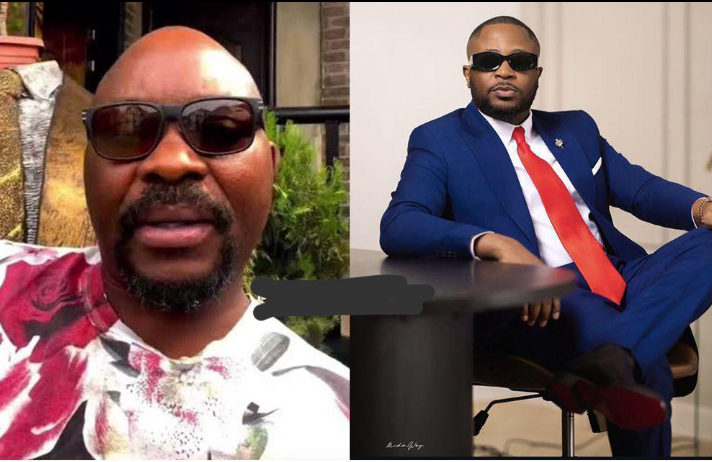
"Comparing American Passport to Naija Is Like Comparing Heaven to Hell" - Isaac Fayose Backs Tunde Ednut Amid Citizenship Criticism

Media personality Isaac Fayose has stirred controversy on social media following his strong reaction to those criticizing popular entertainer Tunde Ednut for celebrating his newly acquired American citizenship. Fayose, known for his candid opinions, did not hold back as he weighed in on the backlash Tunde faced from some Nigerians.
Tunde Ednut, a well-known content creator and influencer, recently announced that he had officially become a United States citizen. The news, which he shared with excitement and gratitude, sparked mixed reactions online. While many congratulated him on achieving the milestone, others took a different stance, accusing Tunde of undermining his Nigerian roots by seemingly prioritizing his new nationality.
In a now-viral Instagram post, Isaac Fayose openly condemned those who berated Tunde for celebrating his American citizenship. He minced no words, declaring that comparing an American passport to a Nigerian passport was akin to comparing "heaven to hell." Fayose argued that the two passports were incomparable and expressed disbelief that people would criticize Tunde for expressing joy over his citizenship status.
"You can't even compare the two passports in any way," Fayose asserted, highlighting the significant differences in privileges and global perception between the American and Nigerian passports. The media personality also suggested that those making negative comments about Tunde's celebration were merely doing so for the sake of content and controversy.
Fayose's defense of Tunde Ednut has sparked further debate among social media users, with many expressing divided opinions. Some agreed with Fayose's stance, pointing out the undeniable benefits that come with holding an American passport, such as visa-free access to numerous countries, enhanced security, and a higher quality of life. They argued that being proud of acquiring a passport that opens more global opportunities is only natural.
Others, however, felt Fayose's comparison was an unnecessary exaggeration and a slight against Nigeria. They argued that while the American passport undoubtedly offers more travel freedom, it does not mean that Nigerian citizenship should be disregarded or belittled. Critics contended that patriotism should not be equated solely with the advantages of foreign nationality.
Despite the mixed reactions, Fayose did not waver in his congratulatory message to Tunde Ednut. He ended his post by wishing the influencer well and expressing his admiration for the United States, writing, "Anyway, congratulations @mazitundeednut. God bless America!!"
Tunde Ednut himself has not directly responded to the criticisms or Fayose's defense, but he has continued to share posts celebrating his new status as an American citizen. Known for his witty and often controversial content, Tunde seems unbothered by the backlash, focusing instead on the positive responses from his followers and fellow celebrities.
The debate over Tunde's American citizenship highlights a larger issue of how some Nigerians perceive the idea of acquiring foreign nationality. While many view it as a significant achievement and an opportunity for a better life, others believe that it should not overshadow one’s identity and loyalty to their home country.
The allure of American citizenship, particularly for Nigerians, cannot be overstated. The United States is often seen as a land of opportunity, offering better economic prospects, social welfare, and global mobility. With the Nigerian passport often ranking lower in global passport indexes due to visa restrictions, it is no surprise that many aspire to obtain dual citizenship or relocate abroad.
Nevertheless, the debate also touches on the sensitive issue of patriotism and national pride. While celebrating personal achievements is natural, some feel that publicly lauding foreign citizenship over Nigerian identity can come off as dismissive of the challenges and beauty inherent in being Nigerian.
Social commentators have weighed in on the controversy, with some suggesting that both sides of the argument hold valid points. They note that while it is fair for Tunde to rejoice over his American citizenship, it is also important to remain mindful of how such celebrations can be perceived by fellow Nigerians who may feel disheartened by the implication that foreign nationality is inherently superior.
Others pointed out that Fayose’s comments, though bold, reflect the harsh realities many Nigerians face when traveling or living abroad. Stories of visa denials, discrimination, and limited opportunities often plague those holding a Nigerian passport, making the pursuit of a more globally accepted passport appealing to many.
The discourse around Tunde Ednut's citizenship also sheds light on the growing trend of Nigerian celebrities and public figures acquiring foreign citizenship. From musicians and actors to social media influencers, the quest for greater opportunities often leads many to pursue naturalization in countries like the United States, Canada, and the United Kingdom.
Some fans have expressed their support for Tunde, noting that he has always been vocal about his love for both Nigeria and the United States. They believe that achieving American citizenship is simply a personal milestone and not a statement against his Nigerian heritage.
On the other hand, some critics have called for more balance when discussing foreign nationality, urging celebrities to recognize that not everyone has the privilege or opportunity to leave Nigeria. They caution against creating a narrative that places undue value on foreign passports, as this could inadvertently undermine the efforts of those striving to make positive changes within the country.
As the debate rages on, it is evident that conversations about dual nationality and identity will continue to spark differing opinions among Nigerians. For some, acquiring a foreign passport is a testament to hard work and new opportunities. For others, it raises questions about loyalty and the perception of one's homeland.
In the end, Isaac Fayose’s blunt statement and Tunde Ednut’s celebratory posts have ignited a broader dialogue about nationality, pride, and the desire for a better life. While both men continue to stand their ground, the discourse around their perspectives serves as a reflection of the diverse sentiments Nigerians hold regarding identity and the quest for global acceptance.


